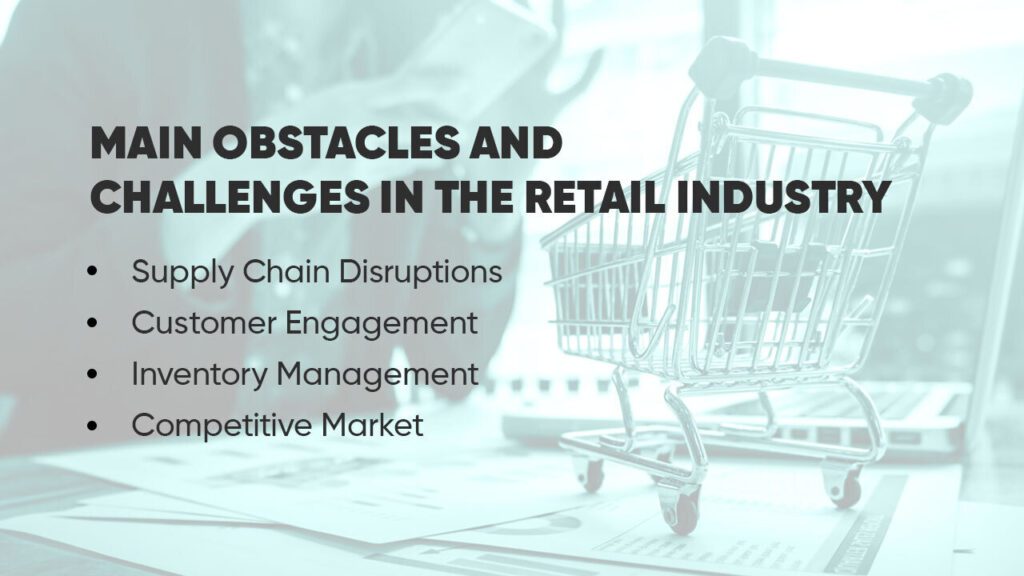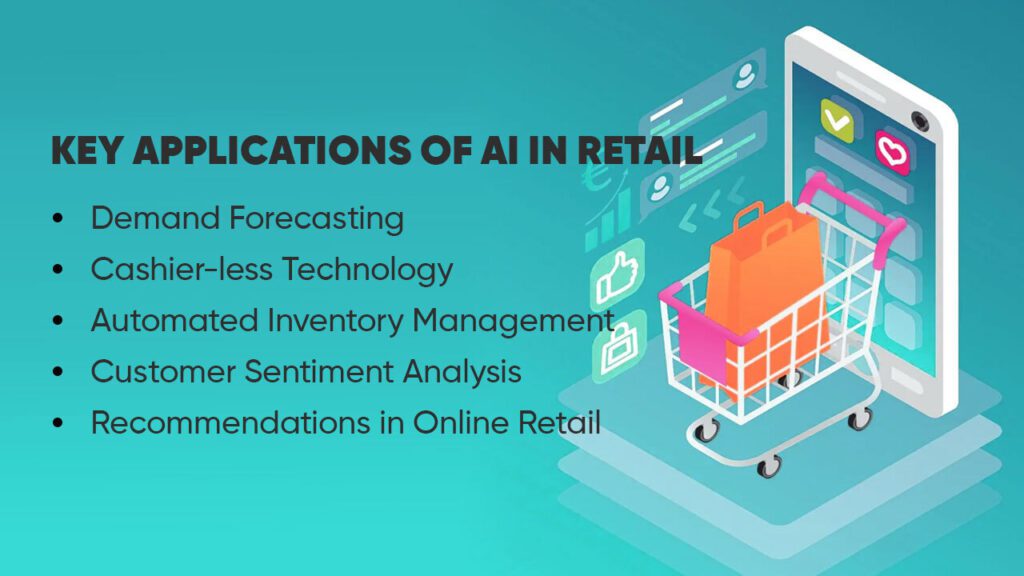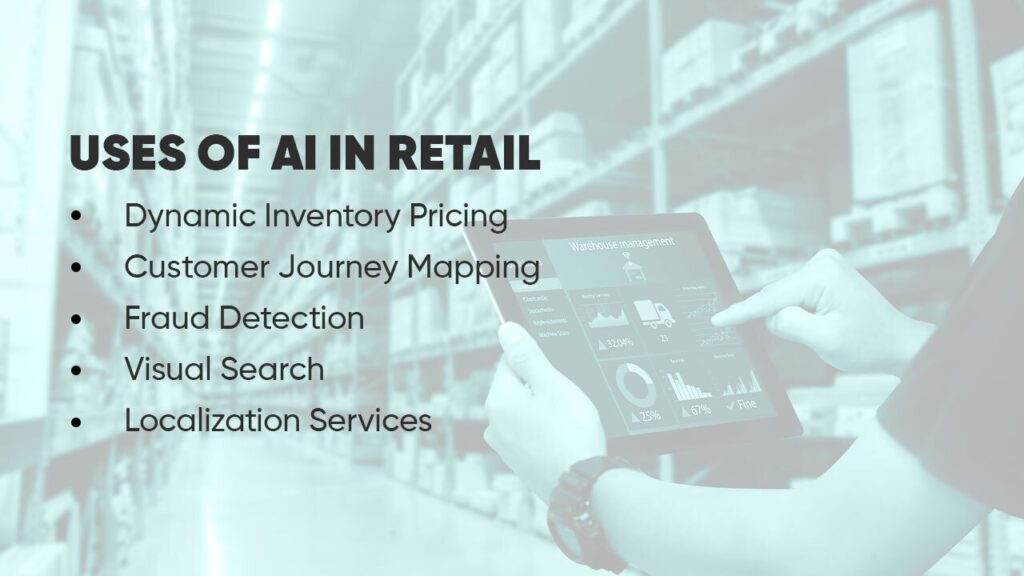In a world where consumer demands are ever-changing and market trends evolve rapidly, staying ahead of the curve is not just a strategy; it’s a necessity. Enter the realm of AI – the game-changing technology that is reshaping how retailers operate, engage with customers, and manage their businesses. This blog will unravel the multifaceted role of AI in the retail sector, from addressing challenges to leveraging opportunities, all geared toward providing an unparalleled shopping experience.

How is AI Revolutionizing Retail? – Unveiling the Power of AI in Retail
AI in Retail – Enhancing Operational Efficiency and Customer Engagement
In the heart of the retail industry, Artificial Intelligence serves as the driving force behind numerous advancements. Retailers are increasingly turning to AI-powered solutions to streamline their operations and enhance customer engagement. AI algorithms process vast datasets, enabling retailers to gain valuable insights into consumer behavior, preferences, and market trends. Using this data, retailers can make informed decisions, optimize inventory levels, and create personalized shopping experiences for their customers.
Main Obstacles and Challenges in the Retail Industry
The daunting hurdles and challenges, in the world of retail, have become catalysts for innovation. These obstacles have pushed retailers to explore tailored AI-driven solutions. Here are some key challenges faced by the retail industry:
- Supply Chain Disruptions: Unforeseen events, such as natural disasters and pandemics, can disrupt the supply chain, causing inventory shortages and logistical challenges.
- Customer Engagement: Maintaining personalized interactions in the digital age is a challenge. Retailers must provide wholesome experiences to engage with tech-savvy customers effectively.
- Inventory Management: Striking the delicate balance between overstocking and understocking is crucial. Having an excess of inventory results in capital being tied up, whereas insufficient stock creates missed sales opportunities.
- Competitive Market: The retail landscape is fiercely competitive. Retailers must innovate continuously to stay ahead, adapting to changing consumer preferences and market trends.

Role of AI in Retail: Navigating Challenges, Optimizing Operations
Amidst these challenges, AI emerges as a strategic ally for retailers. The capacity of the technology to handle extensive data in real-time provides retailers with the means to navigate intricacies and enhance different facets of their operations. AI offers the following pivotal roles in the retail industry:
- Data-Driven Insights: AI processes complex data sets, providing retailers with actionable insights. By analyzing customer behavior and market trends, retailers can tailor their strategies, product offerings, and marketing campaigns.
- Process Automation: AI helps in automating routine tasks, from order taking to inventory management. This automation enhances operational efficiency, allowing retailers to focus on strategic initiatives and customer experiences.
- Elevated Customer Experiences: Through AI-driven personalization, retailers can create unique and tailored experiences for each customer. Personalized product recommendations, targeted marketing, and interactive shopping interfaces enhance customer satisfaction and loyalty.
- Demand Forecasting: AI algorithms analyze historical data, weather patterns, and market demands to forecast consumer behavior. Accurate demand forecasting aids in inventory management, ensuring products are stocked based on predicted demand, reducing excess inventory costs.
Key Applications of AI in Retail: Transforming the Shopping Experience
AI’s integration into retail goes beyond optimizing backend operations; it profoundly impacts the shopping experience. Here are some core applications reshaping how customers interact with retailers:
- Demand Forecasting: AI-driven demand forecasting models analyze historical data, market trends, and even weather patterns to predict consumer demand accurately. Retailers can anticipate which products will be popular during specific seasons or events, enabling precise inventory management and minimizing losses due to overstocking or stockouts.
- Cashier-less Technology: Imagine walking into a store, picking up your desired items, and simply walking out without standing in a checkout line. AI-enabled cashier-less technology, pioneered by companies like Amazon Go, uses computer vision, sensors, and machine learning algorithms to track customers and the products they pick up. Once customers leave the store, the AI system automatically charges their accounts, revolutionizing the in-store shopping experience.
- Automated Inventory Management: AI-driven inventory management systems continuously monitor stock levels, product popularity, and market demand. Retailers can automate restocking processes, ensuring that popular items are always in supply, by analyzing the trend of the data. This prevents revenue loss due to out-of-stock situations and optimizes shelf space by stocking products that align with customer preferences.
- Customer Sentiment Analysis: AI-powered sentiment analysis tools sift through vast amounts of customer feedback, reviews, and social media posts. By analyzing this unstructured data, retailers can gauge public sentiment regarding their products, services, or brand. Utilizing positive sentiments for marketing purposes and responding proactively to negative sentiments, such as addressing product concerns or enhancing customer service, are strategic actions taken based on customer feedback.
- Recommendations in Online Retail: Personalized product recommendations are a hallmark of online retail, enhancing customer engagement and driving sales. AI algorithms analyze customer behavior, preferences, and purchase history to suggest products that align with individual tastes. For instance, when a customer browses for a specific item, the AI system can recommend complementary accessories or similar products, increasing the likelihood of additional purchases.

Examples of AI in Retail – Real-world Innovations Transforming Shopping Experiences
Several leading retailers have embraced AI to innovate their operations and elevate customer satisfaction. Here are notable examples illustrating AI’s transformative power in the retail landscape:
- Amazon Go: Amazon’s cashier-less stores epitomize AI-driven retail innovation. Utilizing computer vision, sensor fusion, and deep learning algorithms, Amazon Go stores allow customers to shop without traditional checkout. Monitoring selected items through cameras and sensors, Amazon automatically processes charges to customers’ accounts upon their exit. This seamless shopping experience redefines convenience in physical retail.
- Walmart’s Inventory Management: Walmart, one of the world’s largest retailers, employs AI to gain competitive advantage in the market. The retail giant utilizes AI-powered robots equipped with cameras and sensors to scan shelves, identify out-of-stock items, and track price discrepancies. Utilizing this up-to-the-minute information, Walmart ensures precise inventory levels, guaranteeing the availability of products to meet customer demand.
- Chatbots in Customer Service: Numerous retailers, both online and brick-and-mortar, leverage AI-driven chatbots to enhance customer service. These chatbots, powered by natural language processing (NLP) algorithms, engage with customers in real-time, answering queries, providing product information, and guiding customers through the purchase process. This instant support improves customer satisfaction and fosters a positive shopping experience.
- Dynamic Pricing Strategies: In the airlines and online retail industry product prices are set based on multiple factors, such as demand influx and competitor pricing. AI algorithms analyze these factors in real-time, enabling retailers to optimize pricing strategies dynamically. For example, during periods of high demand, AI may recommend slightly increasing product prices, maximizing revenue without deterring potential buyers.
These real-world examples highlight the diverse applications of AI in retail, showcasing how innovative technologies are reshaping traditional retail paradigms and creating unparalleled shopping journeys for consumers. As we move forward, AI’s role in retail is expected to expand further, introducing even more sophisticated and customer-centric solutions.
Uses of AI in Retail: Unlocking Advanced Capabilities
AI serves as a versatile tool in the world of retail, offering a multitude of applications that enhance operational efficiency and customer satisfaction. Let’s explore additional use cases where AI plays a pivotal role:
- Dynamic Inventory Pricing: AI algorithms continuously assess market demand, competitor pricing, and customer behavior to adjust product prices dynamically. With such dynamic pricing strategies, retailers can now maximize their profits by setting optimal prices in real-time.
- Customer Journey Mapping: Now with the use of AI, retailers can keep track of all the different interactions consumer makes throughout their purchase journey. By mapping the customer journey comprehensively, retailers gain invaluable insights into consumer behavior. This understanding allows retailers to tailor marketing strategies, optimize advertising campaigns, and enhance customer touchpoints, creating a seamless and engaging shopping experience.
- Fraud Detection: AI-powered fraud detection systems analyze transaction patterns and identify anomalies in real-time. AI algorithms help flag potential fraud attempts, e.g. if there occur any conspicuous transactions the management is readily alerted. This proactive approach helps retailers prevent financial losses and maintain the integrity of their transactions, safeguarding both the business and its customers.
- Visual Search: Now with the help of AI, customers can search for their desired product item by the mere use of an image. By leveraging computer vision algorithms, retailers enable users to upload images of desired products, and the AI system identifies similar or identical items from the inventory. This intuitive search experience enhances user engagement, simplifying the product discovery process for customers.
- Localization Services: AI-driven localization services analyze regional preferences, cultural nuances, and market trends specific to geographic locations. Retailers can tailor their product offerings, marketing campaigns, and promotions based on these insights. Personalizing offerings according to local tastes enhances customer relevance, fostering a deeper connection between the brand and its diverse customer base.

How Odyssey Analytics Empowers Retailers with Data-Driven Excellence?
Nowadays success of any business hinges on unlocking the potential of data, and Odyssey Analytics stands as a trusted ally for retailers in search of inventive solutions. Here’s how we revolutionize the retail landscape with our tailored data and AI services:
- Big Data Analytics for Retail Insight: Odyssey Analytics dives deep into extensive datasets, unraveling intricate patterns within retail data. We decode customer behaviors and market trends, providing retailers with actionable insights. From understanding consumer preferences to optimizing stock levels, our analytics empower retailers with precision.
- Streamlined Data Management Services: Retail data complexity simplified. Odyssey Analytics maintains the accuracy of the data and helps in organizing and preserving it for use. By structuring retail-specific datasets, we facilitate informed choices, enhance customer experiences, and streamline operations.
- Predictive & Prescriptive Analytics for Strategic Moves: Our Predictive & Prescriptive Analytics foresee market shifts, enabling proactive strategies. By anticipating demand fluctuations and suggesting optimal inventory levels, we empower retailers to stay ahead of market demands.
- Effortless Data Migration to Cloud for Retail Agility: We facilitate seamless Data Migration to Cloud, enhancing scalability, accessibility, and security. Critical retail data remains within reach, regardless of the scale of operations, ensuring agile responses to market dynamics.
- Augmented Data Solution for Holistic Insights: Augmenting retail data is crucial for understanding customer preferences. Our Augmented Data Solution enriches datasets, providing a comprehensive view of customer behaviors. Retailers leverage this insight to craft personalized marketing campaigns and product offerings.
- Real-Time Data Ingestion Solution: Our Data Ingestion Solution ensures swift data transfers, enabling real-time insights. Retailers embrace fresh opportunities and swiftly adjust to market changes by utilizing up-to-the-minute data, ensuring flexibility in response to shifts.
- Comprehensive Data Reporting and Visualization: Raw data transformed into actionable insights. Our Data Reporting and Visualization services convert complex data into visually intuitive formats, facilitating quick decision-making and strategic planning for retailers.
Conclusion: Embrace the Future of Retail with AI
As we navigate the intricacies of the modern retail landscape, AI emerges as the catalyst that propels businesses toward unparalleled success. From streamlining supply chains and improving customer engagements to fostering creative shopping experiences, AI in retail emerges not merely as a tool but as a revolutionary influence redesigning the entire industry landscape.
At Odyssey Analytics, we invite you to embrace this future of retail powered by AI. By leveraging our advanced solutions, you unlock the full potential of your retail business. Effortlessly respond to market needs, and bring joy to your customers through highly tailored experiences, to maintain a competitive edge over your competitors.
Transform your retail journey with Odyssey Analytics – Your Gateway to AI-powered Retail Excellence.
Embark on Your Retail AI Journey – Contact Us Now
FAQs
What is AI doing to shopping?
AI is revolutionizing shopping by enhancing personalized recommendations, optimizing inventory, and improving customer service, creating seamless and tailored shopping experiences.
What is the best use of AI in retail?
The best use of AI in retail is its ability to predict customer preferences, optimize pricing and inventory, and provide personalized recommendations, maximizing sales and customer satisfaction.
What is an example of AI in retail?
An example of AI in retail is smart recommendation systems. Companies like Odyssey Analytics, analyze customer data to offer tailored product suggestions, enhancing user engagement and sales.
How will AI affect retail?
AI will transform retail by streamlining operations, predicting consumer trends, and enhancing customer experiences. Retailers can rely on companies like Odyssey Analytics to ensure efficient and personalized services for their customers.